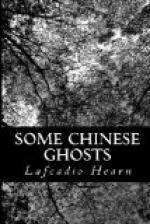“A Japanese legend says that about A.D. 519, a Buddhist priest came to China, and, in order to dedicate his soul entirely to God, he made a vow to pass the day and night in an uninterrupted and unbroken meditation. After many years of this continual watching, he was at length so tired that he fell asleep. On awaking the following morning, he was so sorry he had broken his vow that he cut off both his eyelids and threw them upon the ground. Returning to the same place the following day he observed that each eyelid had become a shrub. This was the tea-shrub, unknown until that time.”
Bretschneider adds that the legend in question seems not to be known to the Chinese; yet in view of the fact that Buddhism itself, with all its marvellous legends, was received by the Japanese from China, it is certainly probable this legend had a Chinese origin,—subsequently disguised by Japanese chronology. My Buddhist texts were drawn from Fernand Hu’s translation of the Dhammapada, and from Leon Feer’s translation from the Thibetan of the “Sutra in Forty-two Articles.” An Orientalist who should condescend in a rare leisure-moment to glance at my work might also discover that I had borrowed an idea or two from the Sanscrit poet, Bhamini-Vilasa.
“The Tale of the Porcelain-God.”—The good Pere D’Entrecolles, who first gave to Europe the secrets of Chinese porcelain-manufacture, wrote one hundred and sixty years ago:—
“The Emperors
of China are, during their lifetime, the most
redoubted of divinities;
and they believe that nothing should ever
stand in the way of
their desires....
“It is related that once upon a time a certain Emperor insisted that some porcelains should be made for him according to a model which he gave. It was answered that the thing was simply impossible; but all such remonstrances only served to excite his desire more and more.... The officers charged by the demigod to supervise and hasten the work treated the workmen with great harshness. The poor wretches spent all their money, took exceeding pains, and received only blows in return. One of them, in a fit of despair, leaped into the blazing furnace, and was instantly burnt to ashes. But the porcelain that was being baked there at the time came out, they say, perfectly beautiful and to the satisfaction of the Emperor.... From that time, the unfortunate workman was regarded as a hero; and his image was made the idol which presides over the manufacture of porcelain.”
It appears that D’Entrecolles mistook the statue of Pou’t’ai, God of Comfort, for that of the real porcelain-deity, as Jacquemart and others observe. This error does not, however, destroy the beauty of the myth; and there is no good reason to doubt that D’Entrecolles related it as it had been told him by some of his Chinese friends at King-te-chin. The researches of Stanislas Julien and others have only tended to confirm the trustworthiness




